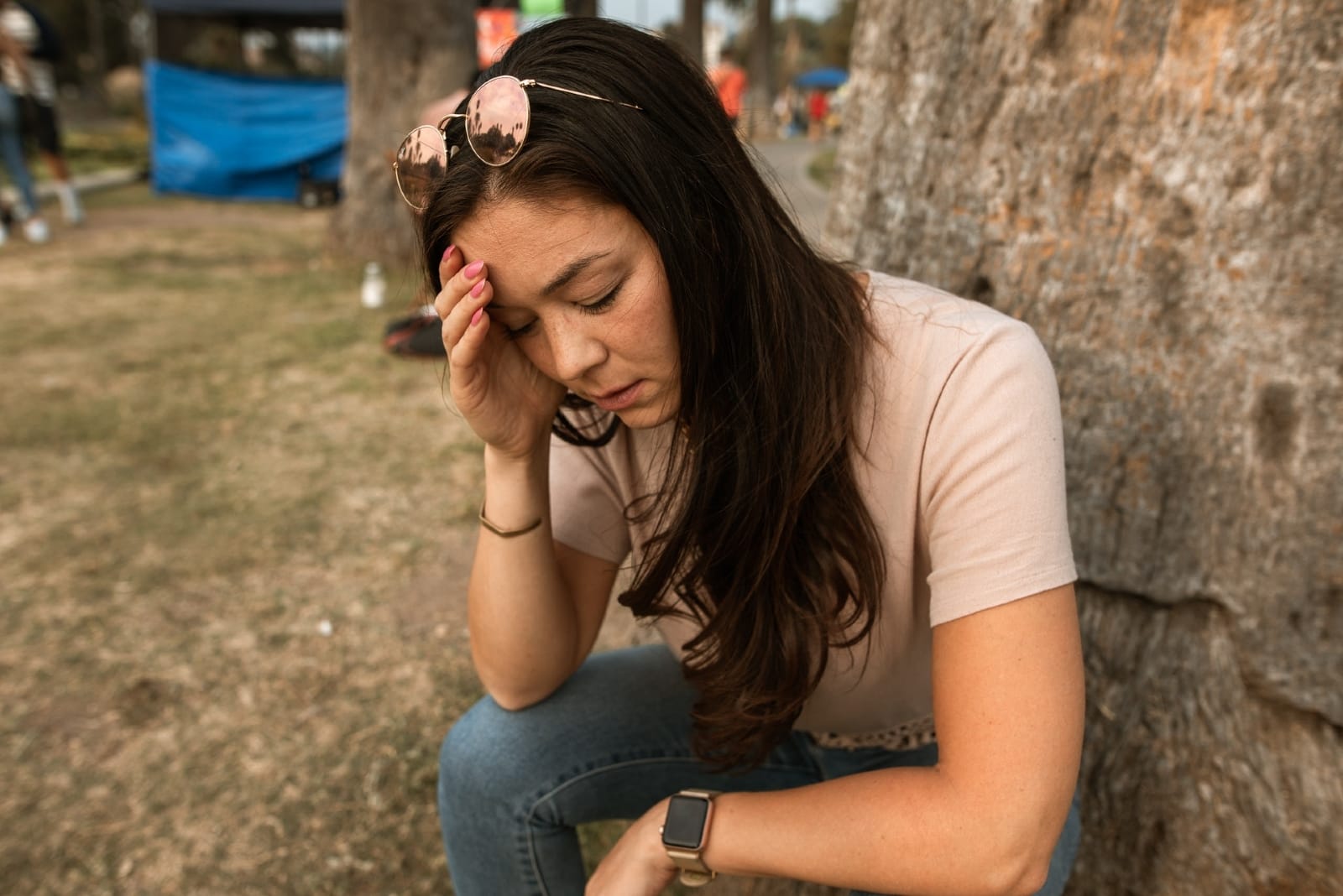Causes, Symptoms And Treatment Of Obsessive Love Disorder
An obsessive love disorder is much different than typical infatuation or romantic love. In simple words, it’s a fixation on your romantic interest.
You just think that you’re in love with this special someone, but you’re actually obsessed with them in an unhealthy way.
Possessive jealousy, the desire to control the object of your affection and manic thoughts of them overwhelm you.
Even though OLD is not in the Diagnostic and Statistical Manual of mental disorders, it is certainly a potentially dangerous disorder that has to be taken seriously.
When you suffer from it, you’re convinced that your obsessive thoughts are real love. You can’t eat, you can’t sleep and all you do is think about your loved one – just like when you’re in love.
However, there is a huge difference between having a healthy relationship and suffering from obsessive love disorder. Here are the causes, symptoms, and treatment options for this mental health disorder.
Causes Of Obsessive Love Disorder
You have to be aware of one thing: things that you’re dealing with right now didn’t arise today. They didn’t hit you out of the blue.
In most cases, all of your mental disorders have been there for a while. You just failed to notice them or they didn’t swim up to the surface until now.
Deeply rooted trauma.

This is exactly the case with your obsessive love disorder. Its main cause is in your deeply rooted traumas, probably sourcing from your childhood.
You might have had a perfectly normal childhood– or at least that’s how things appeared to be. You had enough food, a place to sleep, and a seemingly “normal” family.
However, most people who develop this and similar disorders have actually been emotionally neglected as children.
Maybe you’re not even aware that you feel like your caregivers didn’t love you enough or maybe you were always missing their support.
Or, maybe they pushed you too hard. Is it possible that they’ve always behaved like you failed to meet their expectations?
Well, that is why you keep feeling like you’re not good enough. This is especially the case with the kids whose parents left them behind, but it can also happen to those who had them physically around.
Basically, we all spend our entire lives healing our childhood traumas, and now, you’re trying to get the love you didn’t get back then.
Insecure attachment style.

Another common cause of OLD is your attachment style. I’m sure you’ve already heard about all four of them: secure, dismissive-avoidant, anxious-preoccupied and fearful-avoidant.
If you have an anxious-preoccupied, ambivalent, or insecure attachment style, then as a child, you were constantly worried about your parents rejecting you.
These fears continue to haunt you throughout your adulthood. You project all of your traumas to your romantic partners.
You get so obsessed with the possibility of them leaving you that you end up in a co-dependent relationship.
Deep down, you never trusted your parents. You thought of them as unreliable, and you spent your entire childhood expecting them to abandon you every minute.
Now, when you’re all grown up, this is how you feel about your partner. You question their loyalty and live in constant fear of them walking away from you.
Miserable love past.

You know how I told you that everything that’s going on with you now dates back to your past? Well, this doesn’t mean that I’m necessarily talking about your childhood here only.
OLD can be caused by your love life history as well. If you’ve spent your share of time in a loveless marriage or in abusive relationships – this is the key to your problem.
The same way some parents treated their kids, that’s exactly how your partners from the past treated you. They made you feel unloved, unwanted, and not good enough.
This is especially true if you’ve experienced infidelity from your loved one. Consequently, you start to believe that all women or men are the same.
So, you expect every person who comes into your life to have the same behavioral patterns.
If your ex had considered you not enough and looked for the things you couldn’t give them outside of your relationship, then what prevents your next partner from doing the same thing?
Therefore, you have no other choice but to do everything in your power to keep them by your side.
Obsessive-Compulsive Disorder.

People suffering from OCD have a tendency of developing OLD. But, I’m talking about real OCD here – not the trend in which everyone who is allergic tend to miss self-diagnose themselves with this disorder.
There is also something called relationship OCD. Basically, here, you have obsessive behaviors and thoughts connected to your relationship. You can’t control either no matter how hard you try.
Erotomania.

Another mental health condition common among people with OLD is erotomania, which can be caused by schizophrenia or bipolar disorder.
Here, the patient believes they’re in love with a celebrity to the point where they end up having obsessive thoughts about them that they can’t control.
Don’t mistake this with being someone’s biggest fan. You can be fascinated by their career or even see them as a role model.
However, when you suffer from erotomania, you develop a kind of obsessive-compulsive disorder for your love interest.
Not only that: you also convince yourself that this person has strong feelings for you as well.
Even though your love object is clearly unattainable for you, you still believe that the two of you are meant to be and that this is real love.
In some extreme cases, patients start stalking their love interest or even become violent when they don’t reciprocate their love.
Borderline Personality Disorder

Borderline Personality Disorder often goes hand in hand with OLD. It is characterized by emotional instability, common for those suffering from OLD.
In fact, fear of abandonment is both of these mental health disorder’s number one symptom.
Insecurity.

You don’t have to suffer from a mental health condition to develop OLD. In fact, this disorder is sometimes caused by seemingly small things.
Low self-esteem is common for everyone suffering from an obsessive love disorder. Your insecurities might have different underlying causes, but they’re always there.
However, in most cases, this is not so apparent. In fact, you might even play the role of a self-confident individual who shows no signs of insecurities.
It’s not that you only lie to others about this – you’re not being honest towards yourself either.
You refuse to face your low self-esteem troubles because you know that looking the truth in the eyes would break you.
The problem is that deep down, your narcissistic subconsciousness thinks that your loved one is better than you.
You see yourself as replaceable and not worthy of their love and attention, so you do everything you can to devalue them. After all, that is the only way in which you two can be on the same level, isn’t it?
Not only that: you also think that you’ll never find someone else if they leave you. You see yourself as unlovable and you don’t think you deserve happiness.
So, it doesn’t matter how your significant other treats you – you keep seeing them as a jackpot. After all, they’re the only one who agreed on being with you.
What Are The Symptoms Of Obsessive Love Disorder?
Even though every person is unique, there are some behavioral patterns common for everyone with OLD. These are the red flags you should pay attention to if you suspect having this condition.
Extreme jealousy.

One of the first symptoms of obsessive love disorder is uncontrollable jealousy. But, I’m not talking about cute, typical jealousy here that all couples in love have.
I’m talking about unhealthy jealousy that overwhelms you and takes over your thoughts completely.
Obsessive jealousy
The name speaks for itself: you’re obsessed with the fact that your significant other is doing something behind your back.
You see everyone as a threat: their friends, coworkers, acquaintances, and literally every single person they communicate with.
Whenever they go out without you, you display different types of obsessive behaviors. You think about the possibility of them falling in love with someone else.
You’re constantly worried that they’ll find someone better than you and that they’ll replace you in the blink of an eye.
You check their phone, looking for suspicious text messages, you follow them around and you’re always in search of some kind of evidence.
Delusional jealousy
There is also something called delusional or morbid jealousy, which is even more severe.
This disorder sometimes goes hand in hand with other mental illnesses, such as erotomania, schizophrenia, or bipolar disorder.
In the case of delusional disorder, you’re jealous of “your” celebrity’s loved one and life that doesn’t include you.
Nevertheless, morbid jealousy also happens in real relationships. Basically, you’re convinced that your partner is unfaithful despite not having any proof or facts for your doubts.
You make up impossible scenarios to back up your obsession. You become paranoid and you turn your entire life into a quest for finding evidence for your delusional claims.
Attachment Disorder.

It’s perfectly normal to be emotionally attached to your partner – after all, that’s a part of every romantic relationship.
However, when you suffer from OLD, you show signs of an unhealthy attachment disorder, which is also a mental illness.
Your significant other is the center of your Universe. You’re only happy when they’re around and you don’t care about anything happening outside of your relationship.
You’re not just emotionally dependent on them – you’ve also developed a form of addiction. You couldn’t imagine spending a day without this person since they’re the only ones giving your life meaning.
Everything besides them is pointless, and you put all of your focus and effort into maintaining this relationship. It’s your cause of existence and the only reason to breathe.
Obsessive thoughts.

What if my boyfriend or girlfriend leaves me? Do they really love me? What if they’re seeing someone else? How can I prevent them from walking away from me?
Do these questions sound familiar? Don’t get me wrong: we all have similar thoughts when our relationship enters a crisis.
However, you’re different. These thoughts appear in your mind out of nowhere, even if everything is going smoothly.
Your partner is all you can think about, but you don’t think much about their well-being: your entire focus is on their presence in your life.
And, the worst part is that you can’t control your mind – it goes the other way around.
Well, if this is no obvious sign of an OLD, then what is?
Possessiveness.

There is a huge difference between jealousy and possessiveness. When you’re jealous, your biggest fear is your partner’s infidelity.
You don’t want to lose them to another man or woman, and you will do everything in your power to prevent that from happening.
However, when you’re possessive, you want this person for yourself only.
You don’t like your significant other’s friends and family members simply because they give them the attention that should be reserved for you only.
If it was up to you, they would quit their jobs. They would have no hobbies or interests outside of your relationship.
They should cease to exist as individuals and invest all of their energy into being your girlfriend or boyfriend.
After all, that’s how you roll, so why wouldn’t they? It would be best if you could become this person’s only preoccupation.
Desire for control.

The next on the list of symptoms of obsessive love disorder is the fact that you’re a control freak.
I hate to break it to you, but you’re not your partner’s caregiver nor are they a little child without any proper decision-making skills.
Let’s be honest: you’re masking your real intentions here.
You go under false pretenses that you’re just trying to protect them from everything bad in this harsh world and act like you’re just worried about their well being.
You pretend that you’re taking over a part of their burden while you’re actually taking control over their life, step by step.
You want your partner to live their life your way. In practice, that means they are to follow your orders without any unnecessary questions asked.
After all, you know what’s best for them, don’t you?
Seeking reassurance.

We’ve already established a fact that you’re insecure and that you’re trying to heal your insecurity in all the wrong ways – through your romantic relationships.
When you suffer from this mental disorder, you’re constantly seeking reassurance from your partner.
You ask them questions, such as: “Do you love me?” “Could you live without me?” “What would you do if we broke up?”
No matter how they treat you or what they do to prove their love for you, you never trust them to the fullest. Even though it is pretty apparent how important you are to your partner, your doubts always win.
The worst thing is that there is no right answer to either of these questions – at least not the one that would leave you satisfied.
Maybe they’re not telling you how much they love you as often as you would like to hear it. Or, you’re not happy with the tone of their voice.
This symptom alone can be a sign of relationship anxiety. However, if you display other signs as well, one thing is for sure: you suffer from OLD.
Inability to accept rejection.

You don’t have to actually be in a romantic relationship in order to show red flags of obsessive love disorder. It’s enough for you to have a crush on someone and for that person to reject you.
Let’s be real: nobody likes hearing “no” for an answer. It’s not pleasant to find out that the person you like doesn’t like you back.
This realization crushes our self-esteem and can make everyone feel miserable for a while. However, whether we like it or not, these things happen.
Usually, people in this situation feel bad for some time, but eventually move on. You have to accept that someone isn’t attracted to you or simply doesn’t want to give you a chance.
But, not you. You refuse to grasp this idea and you’re completely unable to take rejection. Ironically, when it happens, your feelings for this person intensify.
You become obsessed with them and you put all of your energy into trying to make them change their mind.
Stalking.

A great number of people suffering from OLD become stalkers at one point in their lives. It doesn’t matter if your love object doesn’t want you or you doubt your partner’s fidelity.
Either way, it’s likely that you’ll invest all of your energy in getting to the bottom of their whereabouts and activities.
You might follow them around or use every opportunity to go through their phone and social media – the bottom line is the same.
How Do You Treat Obsessive Love Disorder?
No contact.

If you want to heal yourself from this mental illness, the first must-do is to cut all possible ties with the object of your infatuation, especially if we’re talking about the person you’re not even romantically involved with.
Trust me: this is not someone you can have a healthy relationship with.
There is no more appearing in the places where you might encounter them, no asking their friends and family members about them, and no stalking them on social media.
Of course, any text messages or phone calls are out of the question.
You’re not doing this to make them feel your absence. You’re doing it to cure yourself.
I know this is the last thing on your mind, but trust me – it’s the only possible option.
Self-occupation.

Meanwhile, you have to keep yourself busy. Focus on occupying yourself with whatever or whoever besides your love interest.
You see, you’ve spent so much time and energy obsessing over this person, so now, you have a lot of empty space in your life.
The second you get bored, you’ll go back to your old ways. That is exactly why you have to find new ways to keep yourself physically and mentally tired.
Find new hobbies, hit the gym, start learning new things, go out with your friends… Do whatever it takes to keep your mind off your obsession.
Psychotherapy.

Seeking medical advice for your health issues is no shame. Visit a professional or call an emergency healthline if you feel like your state is going out of your control.
You’ll get the help you need and experts will present you with different treatment options until you find the one that suits you the best.
When you go to psychotherapy, a mental health professional won’t just handle your symptoms: they will also dig deep inside of you to find the underlying causes of this condition.
Psychiatry sounds scary, but trust me: sometimes, it is the only place where you can learn how to find healthy love in the future.
There, you’ll be surrounded by experts who will hold your hand along the path of your recovery.
You will go through different types of evaluation to help you fix your problem in the long run.
Medication.

Finally, if nothing else helps, you’ll get medication to help you.
However, don’t take any medication without consulting your doctor. Stick to the prescribed dose and I promise you that you’ll feel better in no time.
To Wrap Up:

I’ll be honest with you: an obsessive love disorder can be a severe condition, but luckily, it can be treated effectively.
The most important thing is that you’re aware that you might have a problem. Otherwise, you wouldn’t be here, would you?
It means that you’ve made the first and the hardest step: you faced your condition as much as it scares you. From now on, everything will be much easier and you will heal!







